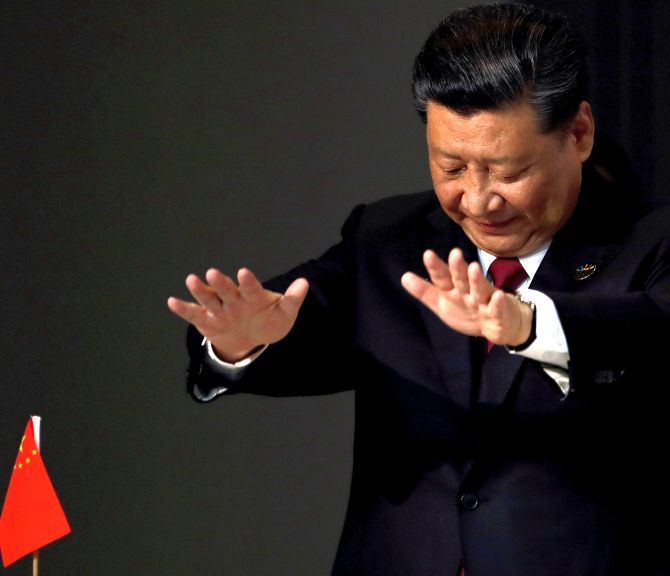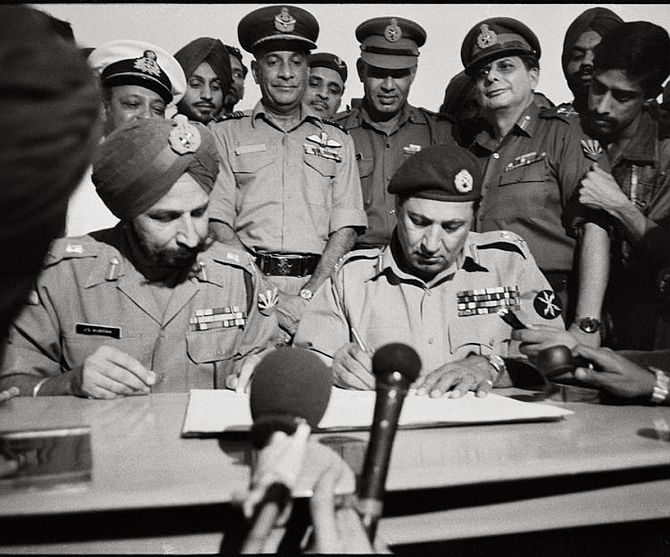'Ladakh is a tiny salami-slice issue.'
'The big one for China is Arunachal Pradesh, more than 83,000 sq km.'
'Do they imagine they can grab any of this by force?'
'In the 21st century, nursing those thoughts only means you need to get your heads examined.'
'It isn't going to happen,' declares Shekhar Gupta.

Addressing troops on his surprise Friday morning visit to Ladakh, Prime Minister Narendra Modi took care not to name China.
But he left no guesswork as to where his message was directed when he said that the era of expansionism was over and that this was time for development.
This was directed at China.
But it is one of those fine lines of pragmatic wisdom that could also be directed at Pakistan or even at ourselves.
I know the risks in my going that far, but let's expand on the thought.
China's expansionism under Xi Jinping is a globally acknowledged issue.
It is the new migraine for the big powers and is crushing toes among most of its neighbours, terrestrial or maritime, barring its clients/surrogate States.
The Chinese, like us Indians, are also a civilisational nation and carry the collective weight of nostalgia about a more glorious past.
In our case, it could be the Akhand Bharat of Mauryan or the Gupta Golden Period.
Theirs is the hankering for a return to the expansive borders of the Qing Dynasty.
Let's describe this, for convenience and brevity, as their 'Akhand China' fantasy.
The difference is, in India, it is the ideology of the founders of just one -- though now dominant -- party in a democracy where power changes hands.
In China, it is central to the only party that rules forever.
How unrealistic and destabilising it is, particularly in the hands of the world's first Deputy Super Power, run by a dictatorial power, we have seen.
Ladakh is a tiny salami-slice issue.
The big one for them is Arunachal Pradesh, more than 83,000 sq km.
Do they imagine they can grab any of this by force? In the 21st century, nursing those thoughts only means you need to get your heads examined.
It isn't going to happen.
But so irresistible is the force of nationalism -- particularly when the fuel propelling it is what political scientists describe as irredentism, the belief that you should restore to your country what was its own at some point in history -- that reason takes the backseat.
This applies to both dictatorships, democracies and systems which are a bit of this and a bit of that.
The Chinese bristled at the prime minister's advice against expansionism, presuming that it was directed at them.
But equally, this could be counsel for Pakistan.
That nation has spent all seven decades of its existence believing it can take away from India all of the state of Jammu and Kashmir.
In that quest it lost a larger part of its own original country. Did it dissuade them?
On the contrary, they became even more desperate to realise that dream.
In the process, they drove out capital, financial and intellectual, as they became a military-ruled, single-agenda State, a chronic basket case with 13 IMF bailouts over 30 years and in crashing need for another one sooner than later.

My old friend and the late Pakistani poet of dissent, Habib Jalib, had put it beautifully -- and cruelly -- in a special May Day composition in 1990 as Pakistan and India seemed poised for war yet again: Nasheeli aankhon, sunehri zulfon ke desh ko kho kar/main hairan hun woh ziqr waadi-e-Kashmir karte hain (after losing the land of enchanting eyes and golden tresses, Bangladesh, I am astounded they still dream of the Valley of Kashmir).
Leftist poets, however, live in a world far too idealistic for ideological nation-States built on one impossible agenda.
The post-war world saw the rise of two ideological States at about the same time: Israel and Pakistan.
One was the promised land for the Jews, the other the 'natural home' or the 'fortress of Islam' for the subcontinent's Muslims.
Israel is by no means perfect. But, compare it with Pakistan.
Both started out as democracies around the same time.
Both became American allies and the West's favourites very early on.
Both were fighting adversaries whose support base lay in the Soviet Bloc.
See, where each one has ended up, politically, economically and socially.
The only area where Israel has failed to achieve its objective is territorial, the West Bank.
But it is different from Pakistan on Kashmir.
Annexation of the West Bank is itself a polarising issue in Israeli democracy and not central to its nationalism.
Pakistan is different.
It is today a Chinese protectorate for all practical purposes, and on its way to being colonised economically.
It still uses terror as leverage against India.
It has shrunk to less than its original.
And it has even less of Kashmir than it was left with in 1948.
From a per capita income about 18 per cent higher than an average Indian's in 1985, today it is about 30 per cent lower and the gap is rising.
Bangladesh has beaten it on all social indicators and will soon do so on per capita income too.

What made the difference? How did lost-cause with starving millions make such a turnaround?
That's because when the East liberated itself from West Pakistan, they also declared freedom from its Kashmir madness.
Which brings us to ourselves, India.
We are philosophically, ideologically and constitutionally committed not just to defending the borders that exist in reality, but reclaiming the ones shown on our map.
In the 70 years since our Independence, we haven't been able to get a square inch more of that territory.
This is despite four large wars and several smaller ones.
The slivers of territories captured by us in 1965 and 1971 had to be returned, as they might have to be in the future as well.
Even the Chinese in 1962 withdrew from all the territory they captured in the east, and almost all, barring some tiny enclaves, in the West (Ladakh).
India has two Parliament resolutions to win back every inch of its territory as shown on its map, in Chinese or Pakistani possession.
We have prolific calls and assertions of that intent.
Among us three neighbours, each wants territory from another, believing it to be its own.
Can China grab Arunachal Pradesh, or even 'at least the district of Tawang' as it has sometimes said, militarily?
Can Pakistan ever see its flag over the Raj Bhavan in Srinagar?
And can India get back Aksai Chin, Muzaffarabad, Gilgit-Baltistan?
None of this is impossible.
But, these large, powerful nations with nuclear weapons can lose territory on such a scale only if they are fully destroyed.
Do we expect a large nuclear nation to be annihilated like that?
And without the other being destroyed too?
That's the reason what each country sees as a dream borders on the fantasy.
I dare not say more on this.
Especially when I can lean on the wisdom of a former navy chief and decorated war hero, Admiral Arun Prakash (Vir Chakra, 1971).
Writing in The Indian Express, the admiral cautioned, 'As a nation, we need to be pragmatic enough to realise that neither conquest nor re-conquest of territory is possible in the 21st century.'
Parliament, the admiral says, should, now, resolve to ask the government, 'to establish with utmost urgency, stable, viable and peaceful national boundaries, all around, so that India can proceed, unhindered, with the vital tasks of nation-building and socio-economic development'."
Irredentism rose in the late 19th century Italy.
It entailed restoring to the country all Italian-speaking districts in the adjoining European nations.
The history of the world since, especially all of the 20th century, tells us that the concept has done nothing but damage to those who embraced it.
It is time all three Himalayan neighbours to reflect and rethink too.
By Special Arrangement with The Print
Feature Production: Aslam Hunani/Rediff.com












 © 2025 Rediff.com -
© 2025 Rediff.com -